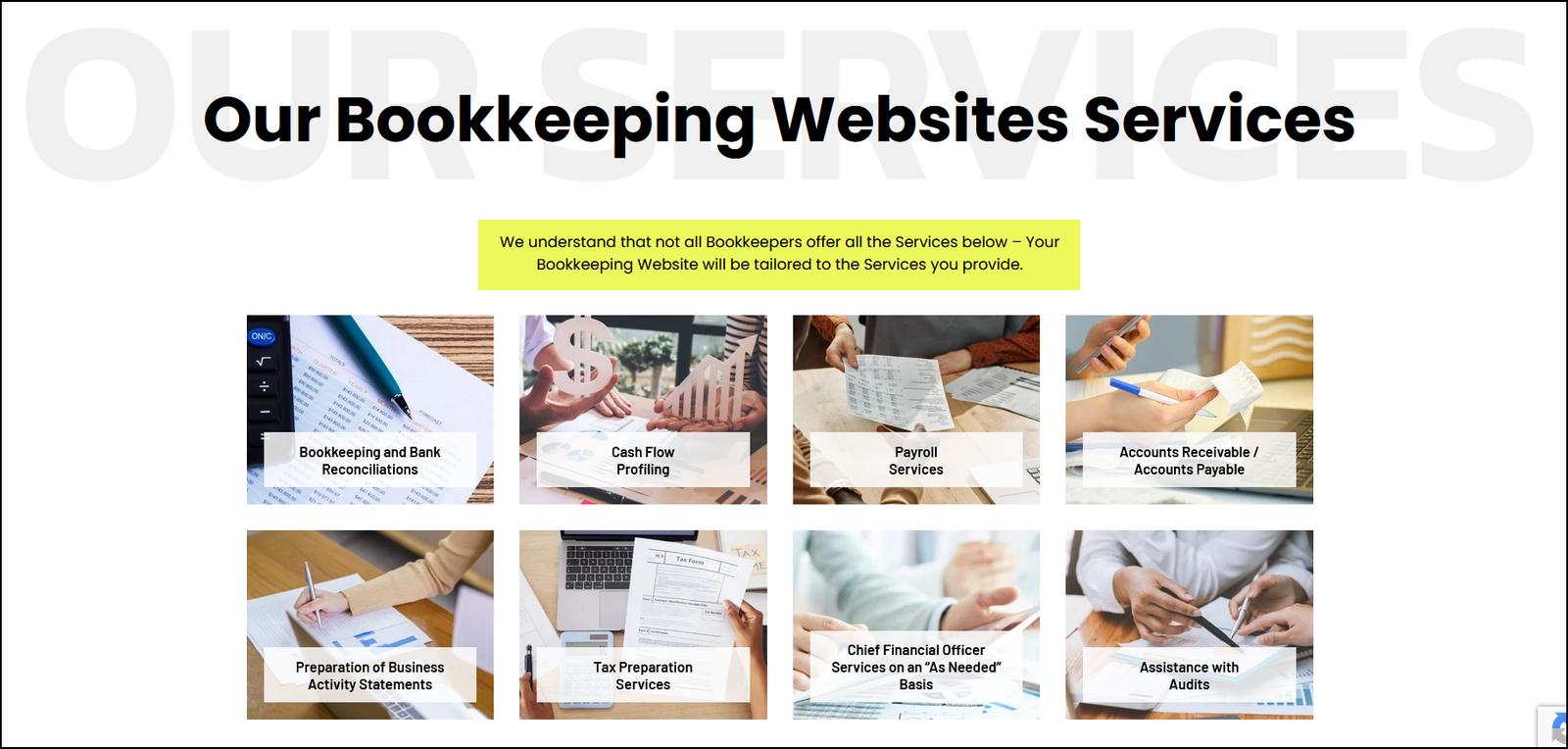Why Bookkeeping Businesses Need Websites
In today’s digital age, having an online presence is no longer an option but a necessity for businesses across all industries, including bookkeepers. A well-designed and optimized Bookkeepers Website can be a game-changer, helping you attract new clients, establish credibility, and streamline your operations. In this comprehensive guide, we’ll explore the compelling reasons why small business bookkeeping companies need a professional website and provide actionable steps to create a Bookkeeping website that drives growth and success.

The Importance of an Online Presence
The internet has revolutionized the way businesses operate and interact with their customers. With millions of people relying on online searches to find products and services, having a strong digital footprint is crucial for bookkeeping firms to stay competitive. A professional website serves as a virtual storefront, enabling potential clients to discover your services, learn about your expertise, and make informed decisions.
Enhancing Credibility and Trust – Why Bookkeeping Businesses Need Websites Explained
In the bookkeeping industry, where clients entrust you with their financial records and sensitive information, establishing trust and credibility is paramount. A well-designed website can help you achieve this by showcasing your qualifications, experience, and testimonials from satisfied clients. By presenting a professional online image, you can instil confidence in potential clients and differentiate yourself from competitors.
Reaching a Wider Audience
Traditional marketing methods, such as print advertisements or word-of-mouth referrals, have their limitations. A website, on the other hand, allows you to reach a vast audience beyond your local area. With search engine optimization (SEO) techniques, you can improve your online visibility and attract clients who are searching for bookkeeping services.
Providing Valuable Information
A website is an excellent platform to educate potential clients about the importance of bookkeeping and the services you offer. By creating informative blog posts, guides, and resources, you can position yourself as an industry expert and build trust with your audience. This valuable content can also improve your website’s search engine rankings, making it easier for potential clients to find you.
Streamlining Client Onboarding and Communication
A well-designed website can simplify the client onboarding process by providing online forms, appointment scheduling, and secure document sharing. This not only enhances the client experience but also saves time and reduces administrative tasks for your bookkeeping business. Additionally, a website can serve as a central hub for communication, allowing all of your clients to access important information and updates easily.
Generating Leads and Conversions
Ultimately, a professional bookkeeping website is a powerful tool for generating leads and converting potential clients into paying customers. By incorporating clear calls-to-action, contact forms, and testimonials, you can encourage visitors to take the next step and engage with your bookkeeping services. Furthermore, integrating lead capture forms and email marketing strategies can help nurture leads and foster long-term client relationships.
Building Your Online Presence: Step-by-Step Guide
Now that we’ve explored the benefits of having a professional website for your bookkeeping business, let’s dive into the practical steps to create one that delivers results.

Step 1: Define Your Target Audience
Before you begin building your website, it’s crucial to understand your target audience. Who are your ideal clients? What are their pain points and needs? By clearly defining your target audience, you can tailor your website’s content, design, and messaging to resonate with them effectively.
If you operate only within a small area, focus your website on that area. This is very important for getting results in Google; If you only service the Gold Coast, or Qld, make that clear. Getting Google Rankings for “Bookkeeping Services Gold Coast” is much easier than getting results for “Bookkeeping Services Australia.” We can help get focussed on What You Do and Where You Do It.
Step 2: Establish Your Website Goals
Your website should serve specific goals that align with your business objectives. Common goals for bookkeeping websites include:
- Attracting new clients
- Showcasing your services and expertise
- Providing valuable resources and educational content
- Streamlining client communication and onboarding
- Building brand awareness and credibility
Clearly defining your website goals will help you create a focused and effective online presence.
Step 3: Choose the Right Platform
When it comes to building your bookkeeping website, you have several options:
- Website Builders: Platforms like Squarespace, Wix, or Weebly offer drag-and-drop interfaces, making it easy to create a reasonable-looking website without extensive coding knowledge. However, you may be limited in terms of Functionality and may have THEIR Ads on YOUR Website.
There is a BETTER way – Call Terry on 0468 420 470 and we will share the Secret with you.
- Content Management Systems (CMS): Popular CMS platforms like WordPress, Joomla, or Drupal provide more flexibility and customization options but may require some technical expertise or the assistance of a web developer.
- Custom Website Development: If you have the budget and specific requirements, you can hire a web development agency or freelancer to create a custom website tailored to your bookkeeping business’s needs.
Consider factors such as your budget, technical skills, and long-term goals when selecting the right platform for your website. Ring Terry on 0468 420 470 for a Free Consultation.
Step 4: Design for User Experience
Your website’s design plays a crucial role in creating a positive user experience and establishing a professional brand image. Prioritize clean and intuitive navigation, clear calls-to-action, and a responsive design that adapts seamlessly to different devices (desktop, tablet, and mobile).
Additionally, incorporate visually appealing elements such as high-quality images, videos, and infographics to engage your audience and effectively communicate your services and expertise.
Step 5: Optimize for Search Engines
Search engine optimization (SEO) is essential for ensuring that your website is visible to potential clients searching for bookkeeping services. Conduct keyword research to identify relevant search terms and incorporate them naturally into your website’s content, meta descriptions, and alt text for images. We do all of this for you!
Additionally, focus on creating high-quality, informative content that provides value to your audience, as this can improve your website’s search engine rankings and establish you as an authority in the bookkeeping industry.
Step 6: Showcase Your Services and Expertise
Your website should clearly highlight the bookkeeping services you offer, your areas of specialization, and your expertise. Create dedicated service pages that provide detailed information about each offering, including descriptions, pricing (if applicable), and the benefits for potential clients.
Additionally, consider including an “About Us” section that introduces your team, their qualifications, and your company’s mission and values. Testimonials from satisfied clients can also be a powerful way to reinforce your credibility and expertise.
Step 7: Incorporate Lead Capture and Conversion Strategies
To maximize the effectiveness of your website, it’s essential to incorporate lead capture and conversion strategies. This can include:
- Contact Forms: Prominently display contact forms on your website, making it easy for potential clients to inquire about your services or request a consultation.
- Lead Magnets: Offer valuable resources, such as e-books, whitepapers, or checklists, in exchange for visitors’ contact information, allowing you to nurture leads and build your email list.
- Calls-to-Action (CTAs): Use compelling CTAs throughout your website, encouraging visitors to take specific actions, such as scheduling a consultation or requesting a quote.
- Online Scheduling: Implement an online scheduling system that allows potential clients to book appointments or consultations directly from your website, streamlining the onboarding process.
Step 8: Integrate Online Scheduling and Payment Systems
To further streamline your operations and improve the client experience, consider integrating online scheduling and payment systems into your website. Online scheduling tools allow clients to book appointments or consultations at their convenience, reducing administrative overhead and ensuring efficient time management.
Similarly, integrating secure online payment systems enables clients to pay for your services directly through your website, eliminating the need for manual invoicing and payment processing. This not only enhances convenience but also improves cash flow and reduces the risk of late payments.
Step 9: Continuously Optimize and Update Your Website
Your website is a living, evolving entity that requires regular maintenance, updates, and optimization to remain effective and relevant. Regularly review your website’s performance, analyse user behaviour data, and make necessary adjustments to improve user experience, search engine rankings, and conversion rates.
Additionally, keep your website’s content fresh by regularly publishing new blog posts, updating service offerings, and showcasing your latest achievements or client testimonials. A well-maintained and up-to-date website not only enhances your credibility but also signals to potential clients that your bookkeeping business is actively engaged and committed to providing top-notch services.
Conclusion
In the digital age, a professional website is no longer a luxury but a necessity for small business bookkeepers. By creating an engaging, informative, and user-friendly online presence, you can attract new clients, establish credibility, streamline operations, and drive business growth. By following the steps outlined in this guide, you can build a website that effectively showcases your expertise, captures leads, and fosters long-lasting client relationships. Embrace the power of the internet and unlock the full potential of your bookkeeping business with a professional website tailored to your unique needs and goals. Now you know why Why Bookkeeping Businesses Need Websites!
Thank You For Reading Our Article on Why Bookkeeping Businesses Need Websites
Need Business Videos? Please Click Here
MORE INFO ON Why Bookkeeping Businesses Need Websites
1. Is there a difference between Free Bookkeeping Websites and NO-COST Bookkeeping websites?
2. Designing A Bookkeeping Website
3. Cash Flow, Financial Accounting and Budgeting
4. Benefits of FAQ Pages for Bookkeeping Websites

